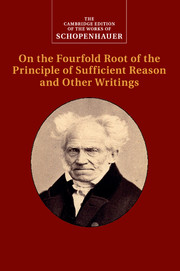Book contents
- Frontmatter
- Contents
- General Editor’s Preface
- Editorial Notes and References
- Introduction
- Notes on Text and Translation
- Chronology
- Bibliography
- Collation of the Two Editions of On the Fourfold Root
- 1 On the Fourfold Root of the Principle of Sufficient Reason
- 2 On Vision and Colours
- 3 On Will in Nature
- Glossary of Names
- Index
Physiology and Pathology
Published online by Cambridge University Press: 30 June 2022
- Frontmatter
- Contents
- General Editor’s Preface
- Editorial Notes and References
- Introduction
- Notes on Text and Translation
- Chronology
- Bibliography
- Collation of the Two Editions of On the Fourfold Root
- 1 On the Fourfold Root of the Principle of Sufficient Reason
- 2 On Vision and Colours
- 3 On Will in Nature
- Glossary of Names
- Index
Summary
Since I classify the empirical corroborations of my theorymentioned above according to the sciences from which they proceed, and thus, as a guide for my discussion, pursue the gradations of nature from highest to lowest, I must first of all speak of a most striking corroboration that my principal dogma has received from the views about physiology and pathology of a veteran of medicine, the physician in ordinary to the King of Denmark, J. D. Brandis, whose Essay on Vital Force (1795) has already been praised by Reil. In his two more recent works, Experiences in the Application of Cold to Illnesses, Berlin 1833, and Nosology and Therapy of Cachexia, 1834, we see him state in the most expressive and striking way that an unconscious will is the primary source of all vital functions, derive from this all processes in the drives of an organism, in sickness as in health, and present it as the prime moverc of life. I must give evidence of this through literal citations from these works, since only readers of works inmedicine would have them at hand.
The first of these two works says, p. viii: ‘The essence of each living organism consists in the fact that it will as far as possible preserve its own being against the macrocosm.’ – P. x: ‘Only one living being, only one will, can reside in an organ at the same time; thus, if a diseased will, one not in harmony with the whole, is present in the cutaneous organ, then cold is able to suppress the diseased will as long as a generation of warmth, a normal will, can be produced by it.’
P. 1: ‘If we must satisfy ourselves that a determiner – a will – must have occurred in any vital act through which the formation appropriate to the whole organism is brought about, and any alteration of the form of the parts is conditioned in harmony with the whole individuality and something to be determined or something to be formed etc.’ – P. 11: ‘With respect to individual life, it must be possible for that which is to be determined to satisfy the determiner, the organic will, if it is to rest content.
Information
- Type
- Chapter
- Information
- Schopenhauer: On the Fourfold Root of the Principle of Sufficient Reason and Other Writings , pp. 331 - 350Publisher: Cambridge University PressPrint publication year: 2012
